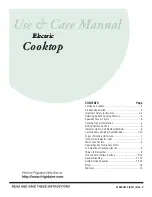
Flame size
For most cooking - Start on the highest control setting and then turn to a
lower one to complete the process. Use the chart bellow as guide for
determining proper flame size for various types of cooking. The size and
type of utensil used and the amount of food being cooked will influence the
setting needed for cooking.
For deep fat frying - Use a thermometer and adjust the surface control knob
accordingly. If the fat is too cool, the food will absorb the fat an be greasy. If
the fat is too hot, the food will brown so quickly that the center will be
undercooked. Do not attempt to deep fat fry too much food at once as the
food will neither brown not cook properly.
Flame size
Type of cooking
High flame
Start most foods; bring water to a
boil; pan broiling
Medium flame
Maintain a slow boil; thicken
sauces, gravies; steam
Low flame
Keep foods cooking; poach; stew
The color of the flame is the key to
proper burner adjustment. A good
flame is clear, blue and hardly visible
in a well-lighted room. Each cone of
flame should be steady and sharply
defined. Adjust or clean burner if
flame is yellow-orange.
Special caution for aluminum foil and aluminum cooking utensils
Aluminum foil - Use of aluminum foil will damage the cooktop. Do not use thin
aluminum cooking utensils or allow foil to touch the ceramic cooktop under
ANY cirumstances.
Aluminum utensils - The melting point of aluminum is much lower than that of
other metals. Care must be taken when aluminum pots or pans are used on
the cooktop. If allowed to boil dry, not only will the utensil be destroyed, but it
may fuse to, break or mark the ceramic glass surface, permanently damaging
the cooktop surface.
ENG
ENG
43 electrolux
tips and advices
tips and advices
electrolux 44




































